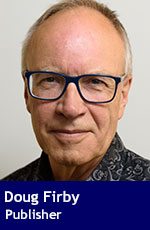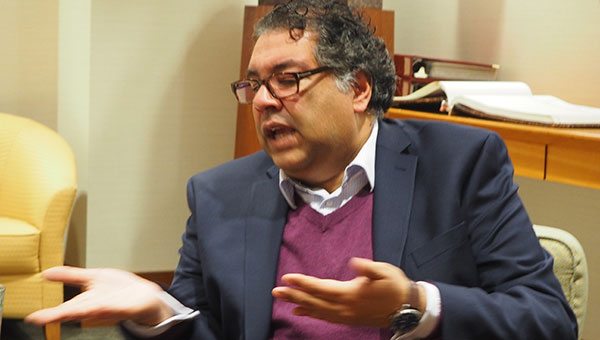Calgary’s Business president and publisher Doug Firby recently sat down with Calgary Mayor Naheed Nenshi to talk about the business climate in the city, known as the oil and gas capital of Canada. This is Part 3 of a three-part series.
 Investing in an Olympics bid for Calgary could pay dividends, unlike pouring public money into a professional hockey arena, says Mayor Naheed Nenshi.
Investing in an Olympics bid for Calgary could pay dividends, unlike pouring public money into a professional hockey arena, says Mayor Naheed Nenshi.
Nenshi says there is a “straightforward” business case to pursue a bid for the 2026 Olympic Winter Games, but no comparable analysis to support investing public tax dollars in an arena to house a National Hockey League team.
“It’s pretty straightforward,” Nenshi said of the Olympic bid, “if we are able to achieve infusion of cash from the IOC (International Olympic Committee), but also from other orders of government.”
In an exclusive interview with Calgary’s Business, Nenshi said those revenue sources will help Calgary rehabilitate the aging sports facilities that were constructed for the 1988 Winter Games.
The facilities, he said, “are an important part of our legacy. And I think all Calgarians would say, ‘No, don’t shutter the Olympic Oval. Don’t close down WinSport.’”
The bid exploration committee was composed of “very sophisticated people,” said Nenshi, not just boosters advocating for a bid. “And every one of them came back and said, ‘I’m convinced of the business case.’”
Nenshi said Calgarians can think of federal and provincial contributions towards the Olympics as a one-time transfer payment back to the city.
“If we can do it in a way that brings us income, from the IOC, from the feds and from the province, that’s pretty cool,” said Nenshi. Because Calgary envisions a cost-effective Games – unlike the recent Olympics in PyeongChang, Rio and Sochi – senior governments will see a benefit from construction that pays back “almost what they put in. And everything else is gravy.”
An arena to replace the aging Saddledome, however, offers little direct economic value to the city, he contended.
“There’s not a study, other than maybe a couple that have been commissioned by people who own sports teams, that shows that public money into a professional sporting venue has direct economic benefit.”
Nenshi noted that in the past when there has been a lockout and no hockey during the regular season, the restaurants and bars on 17th Avenue didn’t see a decline in business. “People have an entertainment budget. They just spend it in other ways. They might go to the movies. They might go to Caesar’s Steak House rather than going to a game. There’s substitution effects there.”
After acrimonious talks last fall, Calgary Sports and Entertainment Corp. (CSEC) – owner of the Calgary Flames NHL team – walked away from the table. CEO Ken King said it’s no longer pursuing a new arena, and NHL commissioner Gary Bettman said that “there would be consequences” if the Flames didn’t get a new arena.
Nenshi noted that the city’s offer and the owners’ counter-offer last fall both proposed giving the owners 100 per cent of event revenues, including for hockey games, concerts and other events.
Calgary Sports and Entertainment declined to respond to Nenshi’s comments.
Nenshi says the city still wants to see an arena built – in part because it could stimulate revitalization in the area.
“If you use an arena as the cornerstone – or a cornerstone – for revitalization of the Victoria Park neighbourhood, creating an entertainment spine from the river to the existing Saddledome and the Stampede grounds, that’s pretty cool.
“If having that arena in place allows us to attract bigger conventions and concerts and other things, then we’re starting to get somewhere very interesting. It allows us to build hotels and apartment buildings in that neighbourhood, it’s all very cool.”
Nenshi, however, is firm that investing public dollars requires public benefit. He noted that Calgary and Edmonton are the only two NHL cities in Canada to have public facilities used by NHL teams. Vancouver, Winnipeg, Toronto, Ottawa and Montreal are all privately owned.
In the U.S., “Las Vegas has had such an amazing season. Private. All private.”
Nenshi pointed to the massive renovation of the city-owned arena in Seattle as an interesting model. The reconstruction work – and even the changes to the road infrastructure – is financed privately.
“Hundred per cent private money. … The developer gave tens of millions in charitable donations to the City of Seattle to say, ‘Thanks for letting us do business here.’”
“And they don’t even have a team yet.”
Nenshi also said he’s not opposed to a plebiscite on the Olympics bid, if done when Calgarians have all the facts needed to make a decision.
“We have to have the plebiscite at a point where there’s actually a deal on the table. This is how much it will cost the city, this is what we’re getting from the IOC, this is what we’re getting from the feds, this is what we’re getting from the province. Do you think we should do it?”
Veteran journalist Doug Firby is publisher of Calgary’s Business and president of Troy Media Digital Solutions.
![]() The views, opinions and positions expressed by columnists and contributors are the author’s alone. They do not inherently or expressly reflect the views, opinions and/or positions of our publication.
The views, opinions and positions expressed by columnists and contributors are the author’s alone. They do not inherently or expressly reflect the views, opinions and/or positions of our publication.


